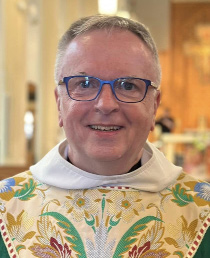
Dear Parishioners and Friends,
This weekend we celebrate the conclusion of the Great Fifty Days of Easter with the Solemnity of Pentecost and the outpouring of the Holy Spirit upon the disciples gathered in the upper room in Jerusalem, about ten days after the Lord’s ascension into heaven.
Some of the Church’s major feasts include a Vigil Mass with separate texts and readings from the actual day of the feast. These days include Christmas, Easter, Pentecost, the Nativity of St. John the Baptist, Saints Peter and Paul, and the Assumption of the Blessed Virgin Mary. What we usually refer to as a Vigil Mass on Saturday is really a Mass of anticipation for the celebration of Sunday. That is why the readings are normally from the Mass of Sunday.
Like the Easter Vigil, which has numerous readings taken from the Old Testament (Genesis, Exodus, Isaiah, Baruch and Ezekiel), the Vigil Mass for Pentecost also includes several readings before the Gospel (Genesis, Exodus, Ezekiel, Joel and Romans). The Gospel for the Vigil is taken from the 7th chapter of John which ends with these words: “On the last and greatest day of the feast, Jesus stood up and exclaimed, ‘Let anyone who thirsts come to me and drink’ … he said this in reference to the Spirit that those who came to believe in him were to receive. There was, of course, no Spirit yet, because Jesus had not yet been glorified.”
The feast mentioned at the start of this passage refers to Sukkot, also called the Feast of Tabernacles or Booths. It began as a one-day fall harvest festival, but over time it became linked with a celebration of the dedication of Solomon’s temple in Jerusalem. Also, because it was a pilgrimage festival and the massive crowds of visitors to Jerusalem were housed in tents, it became a reminder of Exodus, when the Israelites dwelt in tents. By the first century AD, the feast lasted seven or eight days. It was a time of great celebration, including thanksgiving for the harvest and prayers for God’s blessing of rain for the coming year. Every morning during Sukkot, priests and Levites of the temple would go to the Pool of Shiloah (or Siloam), just south of the temple mount, to draw water, which was then poured on the altar of the temple, accompanied by trumpets and singing crowds.
Sukkot and its water-drawing ceremony provide the back-drop for the Gospel at the Vigil Mass for Pentecost. This is the last day, described as the ‘greatest day.’This is when Jesus stands and proclaims himself to be the giver of water. Most likely, his audience would have been shocked by this announcement, after all the excitement of the feast. Living water is a metaphor for the Holy Spirit, and Jesus promises the sending of the Holy Spirit when he is crucified and exalted.*
The readings for the Vigil of Pentecost offer us numerous opportunities for further reflection on the meaning of this great feast. I invite to read them and think about how the words of Scripture, from the earliest times, have led to the revelation of the Holy Spirit.
Genesis 11:1-9: “This is why [the tower] is called Babel, because there the Lord confused the speech of all the world.”
Exodus 19:3-8a,16-20b: “Moses led the people out of the camp to meet God, and they stationed themselves at the foot of the mountain.”
Ezekiel 37:1-14: “Dry bones, hear the word of the Lord! Thus says the Lord God to these bones: See! I will bring spirit into you, that you may come to life.”
Joel 3: 1-5: “Your old men shall dream dreams, your young men shall see visions; even upon the servants and the handmaids, in those days, I will pour out my spirit.”
Romans 8:22-27: “We, who have the firstfruits of the Spirit, also groan within our- selves as we wait for adoption, the redemption of our bodies. For in hope we were saved.”
May you be filled with the joy, peace and power of the Spirit on this Solemnity of Pentecost! Blessings on your week ahead!
Fr. Tim Shreenan, O.F.M.
Pastor

